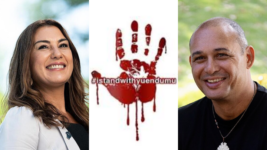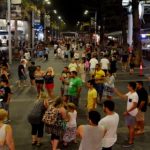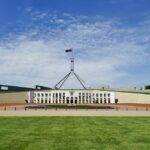The Australian System Is Designed to Deny Accountability for Aboriginal Deaths in Custody

The slim reports regarding the circumstances of last week’s Aboriginal death in custody tells us that at around 1 pm on 27 May 2025 in Coles Alice Springs, Kumanjayi White, a 24-year-old Warlpiri man with disabilities, who presented obviously as such, had been approached over potential shoplifting by store security, when two plainclothes police officers took over and killed him.
The Northern Territory criminal justice system has since done what all such Australian systems do in circumstances where a police officer or a prison guard kills a First Nations person and that’s go into a type of lockdown that involves all related evidence, including CCTV footage, disappearing from public sight, while local law enforcement guards its right to be the sole investigator of the incident.
When calls for independent inquiries are made, as is now happening in respect of the death of the young Warlpiri man, local law enforcement goes into overdrive in protecting its right to investigate its own, and the ministers of the relevant state or territory governments rise to support the local police agency in its efforts to keep everything under wraps until its ready to provide its version of events.
The killing of Aboriginal and Torres Strait Islander people by police and corrections officers is not uncommon in Australia. While the charging of officers involved is a rare occurrence, a conviction in relation to an Aboriginal custody death is unknown. And the clockwork manner in which the authorities deal with such incidents, reveals why there are no convictions and nothing changes.
Australian police don’t kill non-Indigenous people with disabilities because they don’t quite get how the supermarket works. Australian police only kill vulnerable First Nations people in regard to such matters. And Australian police have been killing the First Peoples of this continent since their inception, and they’ve been getting away with it for that entire time.
Federal intervention demeaned
Due to his disabilities, Kumanjayi White lived in supported state care in Mparntwe-Alice Springs. The impact of his death in custody has been heightened not solely because of the callousness of which it appears to entail, but because he is from the remote Aboriginal community of Yuendumu, which was where 19-year-old Warlpiri teen Kumanjayi Walker was shot dead by police in 2019.
The calls for an independent investigation into Aboriginal deaths in custody are made because the idea that a policing agency that has, yet again, been involved in the death of a First Nations person is going to honestly investigate the officers involved, when all officers operate in a uniform manner on the beat, is a bit far-fetched, especially as there’s never been a conviction in relation to such a death.
But what has not been a textbook reaction to the First Nations custody death is that the federal Indigenous affairs minister stepped in early and called for an independent inquiry. Senator Malarndirri McCarthy told the press that there ought to be another body charged with investigating this recent incident, as Yuendumu has experienced “many traumas”.
In her statement, the minister is foremostly referring to the November 2019 killing of Kumanjayi Walker, which was perpetrated by then NT police constable Zachary Rolfe. NT police did investigate this incident, and the charging of Rolfe was one of the rare occasions where the authorities did actually lay charges against an officer involved in an Indigenous custodial death.
Rolfe received a sliding scale of charges, comprising of firstly, murder, which if he was not found guilty of, was then followed by a count of manslaughter and if that failed, he was also charged with violent act causing death.
Yet, despite having fired two bullets directly into the side of Walker’s torso, who was on the floor with Rolfe’s partner on top of him, the all-non-Indigenous jury acquitted the former cop of all three charges.
In response to Yanyuwa woman Senator McCarthy’s call for an independent inquiry, Northern Territory chief minister Lia Finocchiaro said she’d spoken to the minister and had rejected her suggestion.
Finocchiaro, who’s also police minister, actually went as far as to say that she found her exchange with minister McCarthy “really unhelpful to have an uneducated conversation about” the inquiry issue. And if that sounds like the head of the NT Country Liberal government not only belittling the minister but acting in a racist manner towards her, well, that’s exactly what’s expected from her
Cracking down on First Peoples
“A mere glimpse at the record of police investigating themselves when there are allegations of racial violence against them is enough to understand why the family and community are calling for an independent investigation,” said Justice Not Jail’s spokesperson Thomas Mayo in a statement on Monday.
“I ask anyone with a sense for fairness and justice to loudly support the family of Kumanjayi White and their demands,” the Kaurareg, Kalkalgal and Erubamle man added.
Kumanjayi White’s grandfather Warlpiri elder Uncle Ned Jampijinpa Hargraves listed those demands in the wake of the tragic killing of his jaja-grandson, which include the release of the CCTV footage of the incident, an independent investigation of it and that the media and police stop attempting to vilify the deceased man.
Justice Not Jails further set out that the recent death has occurred within the context of the ultraconservative shift in the political climate of the Northern Territory, ever since the Country Liberals took office last August, which has involved “relentless and racist attacks on Aboriginal families and communities.”
“These attacks include reforms to bail and sentencing that have significantly increased the number of Aboriginal people in prison,” the justice group continued, and added that just last month the Finocchiaro ministry revoked the law requiring judges consider imprisonment as a measure of last resort, which was a recommendation of the Royal Commission into Aboriginal Deaths in Custody.
Since the Royal Commission handed down its recommendation in 1991, 596 additional Aboriginal and/or Torres Strait Islander deaths in custody have occurred. And right now, 36 percent of the nation’s adult prisoner population is made up of First Nations inmates, while Indigenous people only make up 3.8 percent of the broader populace.
Getting away with it
The much-anticipated coronial inquest report into the death of Kumanjayi Walker was set to be released on the 10 June, but this has been postponed until July in order to allow the Yuendumu community time to grieve the loss of another of its young ones to the lethal force of the NT police, which certainly adds credence to McCarthy’s statement regarding the community’s many traumas.
One witness has told the press that one plainclothes officer had their knee on the back of Kumanjayi White’s neck, which suggests that the pair of police had the young man face down on the ground, securing him in the prone position, which is well known to be a potentially fatal hold.
Numerous First Nations deaths in custody have involved multiple police applying pressure to the person in custody’s back as they’re held facedown, until they stop breathing. This includes the deaths of Dunghutti man David Dungay Junior in 2015, Wiradjuri, Kookatha and Wirangu man Wayne “Fella” Morrison in 2016 and Noongar man Mr Riley in 2017, to name a few.
Dozens of protest actions are being held across the continent in relation to the police killing of Kumanjayi White, and all the other Aboriginal deaths in custody that have transpired, in much the same way as demonstrations against Israel’s mass killing of Palestinians have been happening. Indeed, both settler colonial nations are continuing to kill the sovereign peoples of the land.
“The inquest into Kumanjayi Walker’s death laid bare the racism in NT police,” Senator Lidia Thorpe said in a statement on Thursday. “Now the final findings are being delayed because of this latest killing. It’s trauma after trauma for our families, with no one ever held accountable.”
“Kumanjayi White’s death is not an isolated incident,” the Gunnai, Gunditjmara and Djab Wurrung woman said. “It’s part of a brutal system that targets and kills our people with impunity. Police are not above the law, but they can get away with murder.”







